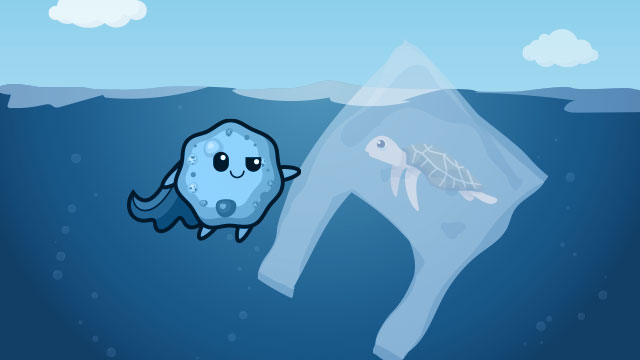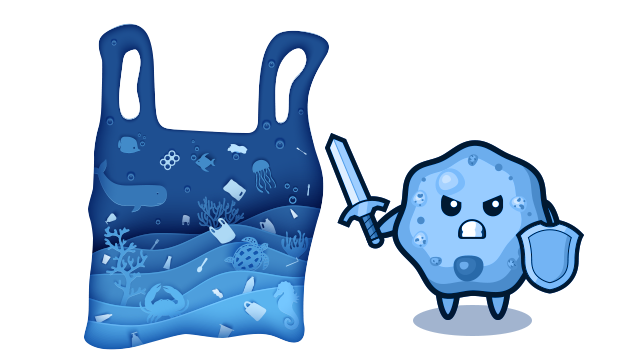FORWARD
Can microbes address the world’s infestation of plastics?
Plastic pollution is a global crisis that poses significant threats to our planet's ecosystems, wildlife, and human health.
A staggering 390.7 million metric tons of plastic were produced in 2019. With 40% of plastics being single-use items, innovative solutions are urgently needed to address this problem.
One such solution gaining attention is the potential role of microbes in tackling plastic pollution. This article will examine the role of microbes in addressing this crisis.
The dire situation of plastic infestation
The plastic waste accumulation rate is alarming, with over 8 million metric tons entering our oceans annually. This pollution has severe consequences for marine life and ecosystems. Over 700 marine species ingest plastics, leading to the death of more than 100 million animals each year. The ingestion and entanglement of plastic debris disrupt marine food chains and habitats.
Subsequently, eating these microplastic-riddle fish also puts human health at stake. Toxic chemicals like bisphenol A found in plastics and microplastics have been discovered in human organs. These contaminants can accumulate in the food chain and pose significant risks. Risks include endocrine disruption and other adverse health effects like cancer.
Contamination of drinking water is also a major concern with plastic pollution. Plastic breaks down into tiny particles that can get into rivers and the ocean and eventually end up in our drinking water sources. These particles come with additional health risks, including developmental disorders and even infertility.
Despite these pressing issues, only about 9% of plastics are recycled globally. There is great emphasis on the need for alternative solutions.
There are certain microorganisms that have the ability to metabolize plastics.
Microbes: nature's tiny warriors against plastic pollution
Microbes comprise various microscopic organisms such as bacteria, fungi, protozoa, and algae. They help maintain our planet's ecosystem by participating in natural decomposition processes.
Recent research indicates that specific microbes can also break down plastics. Microbes produce enzymes that digest polymers within these materials. In short, there are certain microorganisms that have the ability to metabolize plastics. However, due to the complexity of plastic polymers and the wide variety of microbial enzymes, it is not clear which particular bacteria can efficiently degrade them.
So far, studies on microbial degradation have shown promising results for
- PET (polyethylene terephthalate)
- PE (polyethylene)
- PVC (polyvinyl chloride) plastics

Pioneering research and discoveries in microbial plastic degradation
Several groundbreaking discoveries have been made in the field of microbial plastic degradation. One such discovery is the bacterium Ideonella sakaiensis, found by a team of Japanese researchers. This bacterium can break down PET bottles within six weeks. This offers a potential solution for one of the most common forms of plastic pollution. The researchers identified a unique enzyme produced by the bacterium called PETase. It breaks down PET into simpler compounds.
Additionally, Yale researchers discovered Pestalotiopsis microspora. This fungus is interesting because it can degrade polyurethane plastics. Remarkably, it can break down plastics even without oxygen. This suggests potential applications in anaerobic environments like landfills. The discovery opens up new possibilities for strategies with limited oxygen availability.
Chinese researchers identified Aspergillus tubingensis, a fungus capable of degrading polyethylene plastics. This microorganism can break down plastic bags within three months. It offers hope in addressing another widespread form of plastic waste. The study demonstrated that the fungus secretes enzymes onto the surface of the plastic and then absorbs the resulting decomposition products.
Researchers are exploring ways to modify microbes' genetic makeup to enhance their ability to produce enzymes and metabolize plastic components more effectively.
Enhancing microbial efficiency through Genetic Engineering
One approach to improving microbial efficiency in degrading plastics is through genetic engineering. Researchers are exploring ways to modify microbes' genetic makeup to enhance their ability to produce enzymes and metabolize plastic components more effectively. For example, recent studies have used synthetic biology approaches to optimize the PETase enzyme in Ideonella sakaiensis. The result was a higher rate of PET degradation. This strategy can be applied to other plastic-degrading microbes. We could eventually increase their efficiency and expand their range of target plastics.
The challenges and limitations of using microbes to combat plastic pollution

While these microbial solutions show promise, several challenges and limitations must be addressed. First, the speed of degradation remains an issue. It is still better than natural decomposition rates, which can take up to 1000 years. But factors such as temperature, pH levels, and nutrient availability can affect microbial degradation speeds.
Scaling up microbial degradation for large-scale implementation also poses challenges. These would be related to the mass production and distribution of the microbes.
Finally, there are potential ecological impacts when introducing new microbes into various environments. The possible consequences of introducing non-native species into ecosystems must be carefully considered. It could lead to unforeseen ecological disruptions.
The speed of degradation remains an issue. It is still better than natural decomposition rates, which can take up to 1000 years.

Moving forward: the future of microbial solutions for plastic pollution
Ongoing research and development efforts are crucial to enhancing microbial plastic degradation capabilities. Studies are focusing on improving these processes. Genetic engineering and synthetic biology approaches are being employed to create more efficient plastic-degrading microbes. These movements will optimize the enzymes and metabolic pathways involved in plastic degradation.
To harness the potential of microbial solutions, integration into existing waste management systems must occur. Collaboration between researchers, industries, and policymakers will be vital. They must work together to develop strategies that combine microbial solutions with recycling and waste reduction efforts. A comprehensive approach that incorporates biodegradation technologies alongside traditional recycling methods could significantly improve our ability to manage plastic pollution.
Public awareness and supporting sustainable practices
The last aspect of addressing the plastic pollution crisis is increasing public awareness. We must encourage individuals to adopt sustainable practices. Reducing plastic consumption, supporting eco-friendly alternatives, and proper waste disposal can contribute to mitigating the problem. By staying informed and promoting sustainable practices, individuals can play a role in creating a cleaner and healthier planet.
Conclusion
Microbes may offer a promising solution to addressing the global plastic pollution crisis. As we move forward in developing innovative solutions, it is crucial to work together in implementing environmentally responsible strategies for managing plastic waste.
By harnessing the power of these tiny warriors, we may be able to turn the tide against plastic pollution. The goal is to protect our precious ecosystems for future generations. In the meantime, supporting sustainable practices can contribute to a cleaner and healthier planet for all.